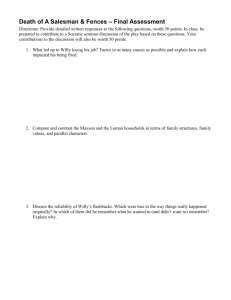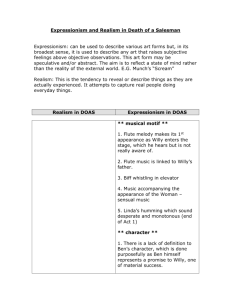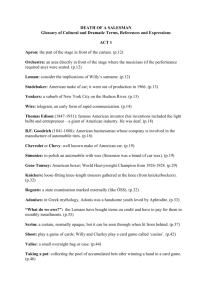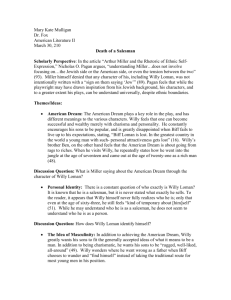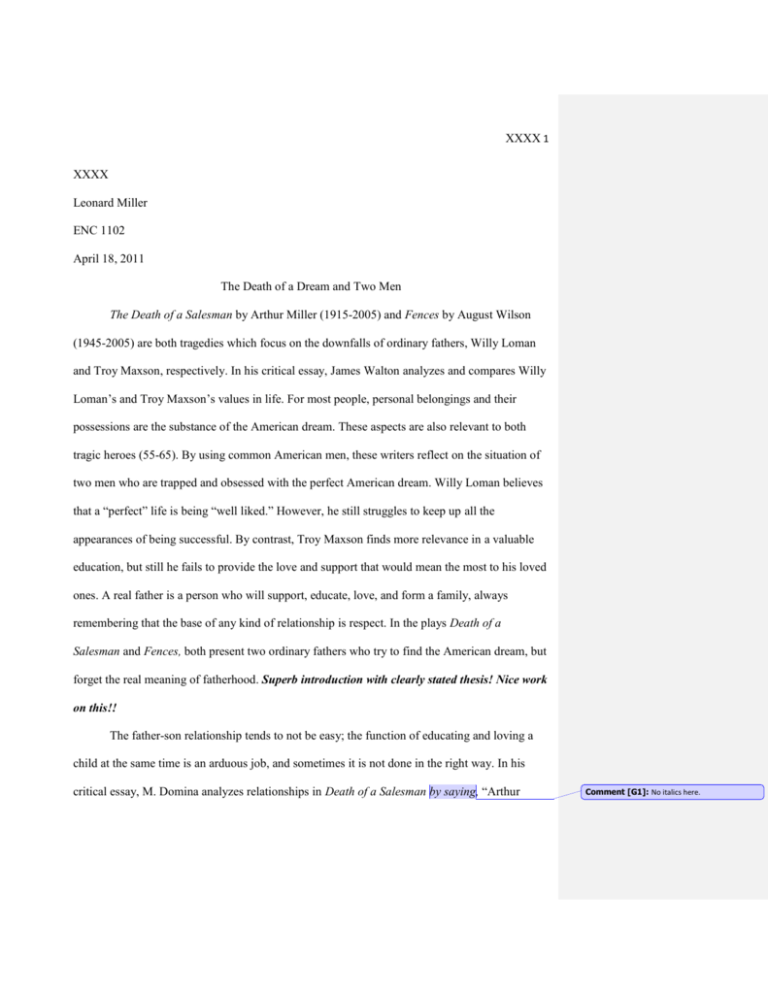
XXXX 1
XXXX
Leonard Miller
ENC 1102
April 18, 2011
The Death of a Dream and Two Men
The Death of a Salesman by Arthur Miller (1915-2005) and Fences by August Wilson
(1945-2005) are both tragedies which focus on the downfalls of ordinary fathers, Willy Loman
and Troy Maxson, respectively. In his critical essay, James Walton analyzes and compares Willy
Loman’s and Troy Maxson’s values in life. For most people, personal belongings and their
possessions are the substance of the American dream. These aspects are also relevant to both
tragic heroes (55-65). By using common American men, these writers reflect on the situation of
two men who are trapped and obsessed with the perfect American dream. Willy Loman believes
that a “perfect” life is being “well liked.” However, he still struggles to keep up all the
appearances of being successful. By contrast, Troy Maxson finds more relevance in a valuable
education, but still he fails to provide the love and support that would mean the most to his loved
ones. A real father is a person who will support, educate, love, and form a family, always
remembering that the base of any kind of relationship is respect. In the plays Death of a
Salesman and Fences, both present two ordinary fathers who try to find the American dream, but
forget the real meaning of fatherhood. Superb introduction with clearly stated thesis! Nice work
on this!!
The father-son relationship tends to not be easy; the function of educating and loving a
child at the same time is an arduous job, and sometimes it is not done in the right way. In his
critical essay, M. Domina analyzes relationships in Death of a Salesman by saying, “Arthur
Comment [G1]: No italics here.
XXXX 2
Miller's classic American play, Death of a Salesman, exposes the relationship between gender
relationships and dysfunctional family behaviors. In this play, the themes of guilt and innocence
and of truth and falsehood are considered through the lens of family roles” (Domina). Willy
Loman is a sixty-three year old salesman who believes in a dream that actually does not exist.
His arrogance and his constant dreaming about unattainable goals deteriorates his relationship
with his family. Instead of focusing on reality, he tries to escape from the concrete jungle in
which he feels boxed. During this process, he misinterprets the way he teaches his boys to face
reality, omitting that real life and real people are not always what one expects them to be. By
trying to be a friend rather than a father, Willy gives his sons Biff and Happy a false sense of
parenting. After Biff stole a football from the school’s locker room, instead of correcting and
teaching his son a lesson about stealing, he just ignored it and created a fictitious excuse about
his son’s “uniqueness.” As Willy tells Biff regarding his coach, “That’s because he likes you. If
someone else took that ball there’d be an uproar. So what’s the report, boys, What’s the report?”
(1782). This type of attitude is what starts to ruin the relationship between Willy and his sons.
Teaching values is one of the most challenging things that parents present to their children, but it
can be the most gratifying. Combining friendship with parenthood may not be the best option to
achieve this purpose, but being a son’s role model in life and having his trust and respect is what
will keep the balance in the father-son relationship. Excellent explication/interpretation!
According to the critical essay, “Family Values in Death of a Salesman,” Steven Centola
relates Willy Loman’s internal conflicts with his Biff‘s failure. “By identifying and analyzing
Willy Loman's values, we can uncover the intrinsic nature of Willy and Biff's conflict.
Discussion of Willy's values specifically clarifies questions pertaining to Willy's infidelity and
singular effort both to seek and escape from conscious recognition of the role he played in Biff's
Comment [G2]: Should be “deteriorate” to
agree with the compound subject: “arrogance” and
“his constant dreaming.”
XXXX 3
failure” (29-41). Early in their lives, Willy and Biff clearly had a congenial relationship; they
both believed and trusted in each other. Willy taught his son Biff that he was above the others
and that he had to be “well liked” in order to achieve success. He forgot to teach his sons that in
order to be successful, the first thing one has to realize is that life is never perfect, and everybody
commits mistakes. The lessons that one learns about these mistakes is what will create values.
People will be able to overcome any kind of adversities, such as the deception of a father towards
his family if there is a basis of good values in the family. Be cautious of over-relying on
primary/secondary resources. You must keep the “Fair Use Law” in mind (10%
source/90%writer).
Wanting to be a father is not the same as being a real father. Fatherhood has to be more
than what a man hopes to be, and Willy Loman illustrates this point. Willy’s preference towards
Biff created a sense of a lack of attention and determination with Happy. To show his desire for
his father’s and his mother’s attention, Happy will repeat, “I’m losing weight, you notice, Pop?”
(1784) as a young boy or “I’m gonna get married, Mom. I wanted to tell you” (1801) as a young
man. This represents the despair that Happy Loman feels by the lack of affection and attention
his parents demonstrate toward him. By being the preferred child, Biff believes that his
uniqueness and superiority will make him achieve the fictitious American dream of which his
father has been dreaming for so long, but all these expectations disappeared the moment that he
sees his father for who he really is. After the realization of his father’s affair, Biff starts to notice
that not everything is perfect and that sometimes the people one admires the most may be the
ones who disappoint the most. During Willy’s trip to Boston, his son Biff travels there to tell his
father that he has fluked math, but what he actually found was that his father was having an
affair. Disappointed he said to his father, “Don’t touch me, you- liar!. You fake! You Phony
XXXX 4
little fake!” (1827). These words of disappointment and frustration are the words that bring Biff
to the realization that his father is not as perfect as he thought. Willy once again fails as a father.
Believing that by ignoring and creating false excuses, Willy thinks that this entire episode will be
erased from everybody’s memories. Instead of trying to explain to his son that mistakes are what
make people human, he instead whimpers how he felt “terribly lonely” (1827). He just pretends
Comment [G3]: You do select the appropriate
pieces of the dialogue to illustrate your main ideas.
that everything was perfect by ignoring and saying to his son, “How dare you cry! Now look,
Biff, when you grow up you’ll understand about these things. You mustn’t- you mustn’t
overemphasize a thing like this. I’ll see Birnbaum first thing in the morning.” These explanations
are not enough for a boy who had put all his admiration into his father. The role of a real father is
one that demonstrates to his children that they also make mistakes and that they will teach them
how to overcome those mistakes. However, Willy Loman, with his constant dreaming, refuses to
accept this important lesson.
Many people grow up with the impression that money and social status are the aspects
that most define a person. In his critical essay, Steven Centola compares these aspects with the
tragic hero Willy Loman by saying, “Willy is probably obsessed with personal appearance
because, in his mind, he was convinced himself that since he is destined for success, he must
constantly dress the part” (29-41). Willy’s American dream obsession leads him to the loss of his
most important belonging, his family. Getting the perfect house, car, wife, and children
represent the greatest wishes for Willy, but at the end, he is not able to obtain any of these. The
day of Willy’s funeral, his son realizes and says the truth about his father, “He had the wrong
dreams. All, all, wrong. Charley, the man didn’t know who he was.” (1836). Willy lost his
identity in the process of achieving these goals; he lost his identity as a father, as a husband, and
as a human being.
Comment [G4]: The real important part of this
quote is what Happy says immediately after that
when he angrily tells his brother, “Don’t say that!!”
This shows Happy’s complete denial of reality and
truth.
XXXX 5
Not only did Willy get disappointed by his dreams but also his wife, Linda, and his
children were disappointed also. Biff was not able to conquer and maintain any kind of job, and
he was not able to accept or analyze any critiques and orders from his superiors. This situation
leads him to a future full of disappointments and failures. His younger son, Happy, felt that he
was never good enough to achieve his goals since he was always behind his brother. In the end,
he becomes his brother’s representation of their mother Linda, always supporting and creating
false expectations that may never become truth like the, “ The Loman Brothers” (1799). Linda, a
woman who always supports and loves her husband, never gets to find her role in the family.
Since she was always repressed under Willy’s orders, she never got to express her feelings and
thoughts. Her husband Willy loved her, but never supported her. He always silenced her with
comments like, “Don’t interrupt” (1799) and other similar insults.
Real life is about people who are able to understand and learn from the past. The
present may not be perfect, but still some people are able to adapt and make the best of it. Willy
Loman, a salesman who could not find himself in his real situation, died with the illusion
of achieving the American dream and of being well liked. With his false sense of reality, Willy
was not able to maintain a supporting and loving relationship with his children, and he ended up
destroying all the admiration that his son Biff has towards him. After a man becomes a real
father, he will have to learn that one of the most reasonable lessons that they can give to their
children will be that life is about suffering, learning, and succeeding, and that human beings
commit mistakes in order to achieve real happiness. This important lesson is the one that Willy
Loman did not apply to his life, and therefore did not teach to his children Biff and Happy. Once
again, EXCELLENT explication/interpretation here, XXXX. I am so proud of you and your
work. I know you diligently worked on this and it certainly shows.
XXXX 6
Human beings cannot change the past, but can learn from it; cannot escape from the
present but can work to achieve a better one; and cannot predict the future, but can commit
themselves to improve it. Troy Maxson is a proud African American who is a hard worker and
the family breadwinner. He works as a garbage lifter at the sanitation department with his friend
Jim Bono. Troy’s relationship with his family gets affected by the extreme pride he feels for
himself and his denial to accept failure. Troy’s wife Rose is a loving compassionate woman who
cares about the familial union. She requests her husband built a fence in order to keep the ones
that she loves closer to her, but in the end, this fence seems to be built too late.
Even though the circumstances for African Americans were tough at the time, Troy was a
man who was proud of all the things that he has achieved, and he wants to teach this lesson to
Lyons, Cory, and Raynell, his children. According to Gaylord Brewer’s critical essay, “Fences is
a conventionally structured family melodrama, but it is its central character, Troy Maxson, who
influences and determines nearly every aspect of the other characters' lives” (120-139). The
perception that Troy had towards his father may be what created his attitude towards parenthood.
He referred to his father as the “devil.” When Troy and Bono were having a conversation about
their father, Troy explained why he hated his father and how he became a man at the age of
fourteen by saying, “Sometimes I wish I hadn’t known my daddy. He ain’t cared nothing about
no kids. A kid to him wasn’t nothing. All he wanted was for you to learn how to walk so he
could start you to working.” (1864). Troy’s mother was forced to abandon their children because
she could not suffer any longer. Troy was afraid of his daddy and never received any
demonstration of love towards him. Instead, at the age of fourteen, he had to witness how his
father raped Joe Canewell’s daughter. Usually human beings try to avoid the mistakes that their
Comment [G5]: Keep to the present tense.
Literature is a “living art form” and needs to be
analyzed in the present tense.
XXXX 7
parents made, but by trying to be different from his father, he ends up being just like him, a
father who was not able to love and support his family.
Some fathers, like Troy, believe that all the family decisions only center on them, and
want to get all the attention and ignoring any kind of perception of reality different from their
own. Troy’s sexist character leads him to ignore his family’s needs for listening and moral
support. Lyons is a thirty-four year old who plays jazz music. He is Troy’s first child, but for
Lyons, Troy does not represent any aspects of a father. Every Friday is payday; Troy and Bono
usually go to Troy’s house to talk about the past and their experiences and to enjoy some drinks
together. Since it is Troy’s payday, Lyons goes to his father’s house in order to get ten dollars
from him. As usual, his father is always complaining about Lyons’s decisions and the way he is
wasting his life with jazz music that he refers as “ Chinese music” (1863), but Lyons denies him
the right to reproach him by saying, “ You can’t change me, pop. I’m thirty-four years old. If you
wanted to change me, you should have been there when I was growing up. I come by to see
you... ask for ten dollars and you want to talk about how I was raised. You don’t know nothing
about how I was raised” (1849). Troy was not able to raise Lyons because he was in jail for
almost all his childhood, and now that he is a grownup, Lyons believes that he does not have any
right to tell him how to live his life. The first years of an infant usually are the most important in
order to form a solid father-son relationship, but the lack of affection and love that he received
during these years damaged their relationship.
Being a father is not only about supporting a family economically; a real father means
much more than that. Cory is Troy and Rose’s child. He is a teenager whose dream is to be a
professional football player, but his father refuses to let him achieve this dream. As an
adolescent, Troy also had the dream of going to the major leagues as a baseball player, but this
XXXX 8
dream was frustrated because by the time, African Americans were not accepted into the major
leagues, but later when they were accepted, he was already too old. Troy perceived parenthood
as a job rather than a loving relationship. He explained this concept to Cory after a discussion
about how society had changed and African Americans had been winning more respect and
acceptance by saying, “It’s a job. It’s my responsibility! you understand that? A man got to take
care of his family. You live in my house... sleep you behind on my bedclothes... fill your belly up
with food… cause you my son” (1859).
A father is a person who cares about his children’s expectations and teaches them the best
way to achieve those in order to become better human beings. Troy refuses to support his son
because this would mean the acceptance of his own failure. Even though times have changed,
Troy’s perception of the past has stayed with him into the present. He was so concerned with his
own survival in his stagnant, disappointing life that he forgot to understand the ways in which his
loved ones have learned to overcome adversities. As an adult, Cory was a member of the
Marines, and even though he has a good quality of life, he still blamed his father for ruining his
dream. Troy supported his family economically, but he failed to provide them love and care and
this is why Cory refused to give his father credit for the material things.
Troy Maxson is a man who believed that he could not commit any kind of mistakes, but
Comment [G6]: Should be “believes”
what he did not realize was that his selfishness led him to loneliness. According to Gaylord
Brewer, “Fences establishes the difficulties of acceptance and release in both directions of a
man's history: from the father, then from the son” (120-139). Even though Troy presented many
failures in life, he still believed that he could hide these from his reality. He did not not realize
that he was exactly what he did not want to be. Troy Maxson was just like his father. After the
realization of his affair with Alberta, all his “perfectness” seemed to vanish, and his new baby
Comment [G7]: presents
XXXX 9
Raynell, who was born under sin, represented his third failure as a father. Troy created excuses
about his romance with Alberta by saying that with her he could get a different understanding
about himself and that he “can step out of his house and get away from the pressures and
problems” (1872). This demonstrates how Troy tried to put the responsibility of his acts on
others, trying not to ruin his role as the “perfect” husband and father that he think he was.
Rose’s purpose of building the fence was to keep her family close to her, but Troy seems
to not understand it. While Bono, Cory, and Troy built the fence, Bono explained to Troy its
purpose, “Some people build fences to keep people out... and other people build fences to keep
people in. Rose wants to hold on to you all. She loves you” (1869). Rose tried so hard to keep
her family together , but at the end of the play, their house was no longer a real home. After
Troy’s tragic flow, loneliness was his only company. His wife, children, and friends left him
alone with his arrogance and his frustrated dreams.
In his critical essay, James Walton, goes on to compares not only Miller and Wilson as
playwrights, but also discusses the similarities of both plays. They both were playwrights who
presented similarities as humans, and reflects this point by saying, “Besides being very well
known playwrights, they also were sired by Anglo fathers, both have had a number of marriages,
and both wrote plays that might be deemed, in part, to be autobiographical” (55-65). The Death
of a Salesman and Fences also presents two fathers who present similarities as fathers and
human beings. Willy Loman and Troy Maxson are two men who tried to do their best as fathers,
but it seems that they did not understand the real meaning of fatherhood. Having and raising a
child does not mean the same as being a real father. The persons who will support their children,
helping to overcome difficulties, teaching about real life, and supporting their children decisions,
are the one who are called daddies. The obsession with the American dream led these two tragic
Comment [G8]: Be wary of using “seems” when
attempting to build an argument. It will weaken
what you say because it appears that the writer
(you) isn’t quite sure, so you are playing it safe.
XXXX 10
heroes to put priorities on material belongings like their houses, but all this will just lead them to
live a life full of false appearances. According to James Walton, “Both Willy Loman and Troy
Maxson are common men, ordinary men--not men of significance or nobility in the Aristotelian
sense of a tragic hero” (55-65). For the ancient Greeks, a tragic hero was a person who came
from a place of elevation or a position of royalty to a low spot in his life, but in comparison,
these two ordinary Americans, who does not come from royalty, can also be declared tragic
heroes. They came from a position of admiration to one of deception.
Willy’s and Troy’s children did not find any kind of real love towards their fathers. The
causes are also similar. Both fathers destroy in one way or another his sons’ aspirations and
dreams. This creates Biff Loman’s need of stealing others belongings and a sense of repulsion
towards his dad. Cory, Lyons, and Raynell Maxson feelings towards their father was simply
deception and abandonment. Both protagonists presented their biggest mistakes by having affairs
with the excuse of escaping the loneliness and pressure of everyday life. Even though they both
had plenty of failure in their lives, they refused to accept it and preferred to be in their own world
of lies. Sometimes human beings prefer denial or try to change the perception of truth because
frequently, truth is hard to accept, and it shows humans’ biggest mistakes. Willy Loman taught
his children lessons about dreaming and superiority, but he forgot to teach them about the efforts
that they would need to put in, in order to achieve all of their goals. In contrast Troy Maxson
taught his sons not to follow their dreams because skin color would not let them achieve a better
future. He felt that the only way to succeed was to get a job and work all of their lives. At the end
of both of these plays, the fathers both died with a feeling of failure and deception towards their
lives.
Comment [G9]: Once you have identified the
author’s full name, it is okay to only use his/her last
name.
XXXX 11
Being a father may not be easy, but still men need to put all their effort and love into
making the father-son relationship work. Willy and Troy found out at the end of their lives that
this American dreams that they had all their life is what took their families’ support and love
away. These two tragic heroes tried to give their best to their children, but during this process
they forgot that being father is an arduous job that will required more that economical support.
Material belongings cannot be compared with father’s care and love. Sometimes humans
misunderstood the real meaning of life, and start to forget that their children will be their legacy
and support when they enter in the adulthood. The Death of a salesman and Fences are two plays
that illustrated how two fathers loose the real meaning of being fathers
Comment [G10]: should be “lose.”
XXXX 12
Works Cited
Brewer, Gaylord. "Holy and Unholy Ghosts: The Legacy of the Father in the Plays of August Wilson."
Naming the Father: Legacies, Genealogies, and Explorations of Fatherhood in Modern and
Contemporary Literature. Ed. Eva Paulino Bueno, Terry Caesar, and William Hummel. Lanham,
Md.: Lexington Books, 2000. 120-139. Rpt. in Drama Criticism. Vol. 31. Detroit: Gale, 2008.
Literature Resources from Gale. Web. 12 Apr. 2011
Centola, Steven R. "Family Values in Death of a Salesman." CLA Journal 37.1 (Sept. 1993): 29-41. Rpt.
in Contemporary Literary Criticism. Ed. Janet Witalec. Vol. 179. Detroit: Gale, 2004. Literature
Resources from Gale. Web. 9 Apr. 2011.
Domina, L. M. "An overview of Death of a Salesman." Drama for Students. Detroit: Gale. Literature
Resources from Gale. Web. 11 Apr. 2011.
Miller, Arthur. The Death of a Salesman. Literature: An Introduction to Fiction, Poetry, Drama and
Writing .Ed. X. J. Kennedy and Dana Gioia. 11th ed. New York: Pearson-Longman, 2010. 17721836. Print.
Wilson, August. Fences. Literature: An Introduction to Fiction, Poetry, Drama and Writing .Ed. X. J.
Kennedy and Dana Gioia. 11th ed. New York: Pearson-Longman, 2010. 1839-87. Print.
Walton, James E. "Death of a Salesman's Willy Loman and Fences's Troy Maxson: Pursuers of the
Elusive American Dream." CLA Journal 47.1 (Sept. 2003): 55-65. Rpt. in Twentieth-Century
Literary Criticism. Vol. 210. Detroit: Gale, 2009. Literature Resources from Gale. Web. 9 Apr.
2011.
XXXX, There have been few essays that I have enjoyed as much as I enjoyed this one. It shows an extraordinary amount
of research, reading, rereading, analyzing, synthesizing, writing, editing, rewriting, etc. I am proud to have been
your instructor this semester and congratulate you on your efforts with this essay.
C/O=20
D=19
S/S=17
G/M=18
R/D=19
TOTAL=93A
Comment [G11]: Your margins here look as it
they might be .5” rather than the required 1” for
MLA.
XXXX 13


